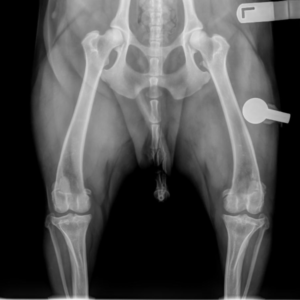
Medial patellar luxation in dogs is a common orthopedic condition describing dislocation of the kneecap.
Have you noticed your dog’s kneecap moving out of its usual location? This may be due to medial patellar luxation. Mount Carmel Animal Hospital shares information about medial patellar luxation in dogs in this article.
What is Medial Patellar Luxation?
Medial patellar luxation in dogs is a common orthopedic condition describing dislocation of the kneecap. Although this condition is more prevalent in small-breed dogs, it can also occur in large breeds. While some dogs have mild luxation that only needs minor management, more severe cases might benefit from surgical correction.
Cause of Patellar Luxation
The exact cause of medial patellar luxation can be based on many factors, but genetics contributes significantly. The orthopedic condition may also occur due to trauma. Patellar luxation happens when the kneecap pops or slides out of place from the femoral groove when the knee flexes, causing dislocation.
Dogs with patellar luxation tend to have a general malalignment of the limb or a more shallow femoral groove involving the tibia, hip, or femur. Luxations can even occur on one or both knees, and the dislocation may be either medial (towards the inside) or lateral (towards the outside). Medial patellar luxation in dogs is common. However, lateral luxation occurs less frequently. As it progresses, the patella dislocates more easily and often, constantly rubbing on the dog’s knee joint cartilage, leading to arthritis.
Signs for Patellar Luxation
The clinical signs of medial patellar luxation in dogs vary depending on the extent of the disease, and mild cases often remain asymptomatic. The most prevalent sign is a “skipping” lameness, which occurs when one hindlimb is suddenly lifted for several “skips,” and then the dog resumes walking normally after shaking or kicking the limb.
Diagnosis
A Mount Carmel Animal Hospital veterinarian can perform a physical exam to diagnose medial patellar luxation in dogs. The exam can help guide treatment recommendations based on the condition’s severity. X-rays might be recommended to further examine the affected limb for contributing orthopedic abnormalities.
Treatment
Treatment of medial patellar luxation depends on the condition’s severity and a dog’s clinical signs. Most mild cases without clinical signs don’t require surgery. The treatment for conservative medical management for dogs with infrequent or intermittent lameness or for those who have developed arthritis secondary to patellar luxation might include the following:
- Joint supplements
- Maintaining an ideal weight
- Exercise restriction
- Physical rehabilitation
- Pain medications such as NSAIDs or nonsteroidal anti-inflammatories
Overall, dogs without clinical signs of patella luxation generally have a great prognosis, and their condition is manageable for many years.
Dogs that are experiencing more severe clinical signs or whose luxation is more extreme require surgical repair. During this surgery, the point of contact between the patellar ligament and the shin bone is moved to the proper location. The femoral groove is then deepened to keep the patella in place and the capsule surrounding the joint is tightened. This permanently prevents the knee cap from being able to pop out of place. Dogs who undergo surgery typically do very well and do not experience a recurrence of patellar instability.
HERE AT MOUNT CARMEL ANIMAL HOSPITAL, WE’LL TREAT YOUR PETS LIKE FAMILY!
Mount Carmel Animal Hospital has been serving the Northern Baltimore/Southern York community for over 30 years and is proud to be an independently operated, small animal practice committed to excellence in veterinary medicine and client service. From grooming to wellness services, along with Canine Life Skills Training Courses, and surgical procedures, we have the expertise that will best serve the needs of you and your pet. Contact us at 410-343-0200 and follow us on Facebook
